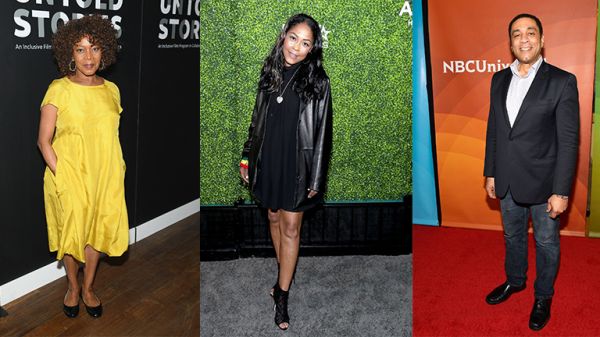Photo by: kali9/Getty Images
Cancer affects every single one of us. Whether you yourself have the disease or know someone who does, cancer impacts millions of individuals every day throughout the world.
According to the CDC, 240,000 women and 2,400 men are estimated to receive a breast cancer diagnosis each year.
Compared to White women, Black women had an overall 8% LOWER incidence rate of cancer. Particularly, breast and lung cancer diagnoses are LESS common among Black women.
However, it’s crucial to take into account the death rates of breast cancer, particularly in disadvantaged areas.
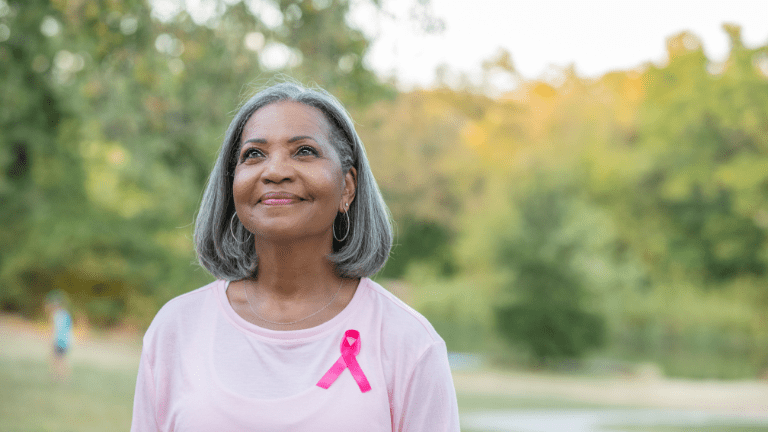
Photo by: Courtney Hale/Getty Images
According to the New England Journal of Medicine, Black women are 40% more likely to die from breast cancer than non-Hispanic white women. This is largely due to the possibility that these populations lack access to resources.
While there are many factors that contribute to persisting inequalities, structural racism is undoubtedly one of the main ones since it exacerbates disparities in socioeconomic factors that affect health, such as access to care.
Socioeconomic inequalities are associated with higher rates of cancer and other disease risk factors as well as lower access to timely, effective cancer prevention, early detection, and treatment. The main cause is inadequate health insurance.
With October being Breast Cancer Awareness Month, here are some tips on how to protect your breast health.
Lifestyle Factors
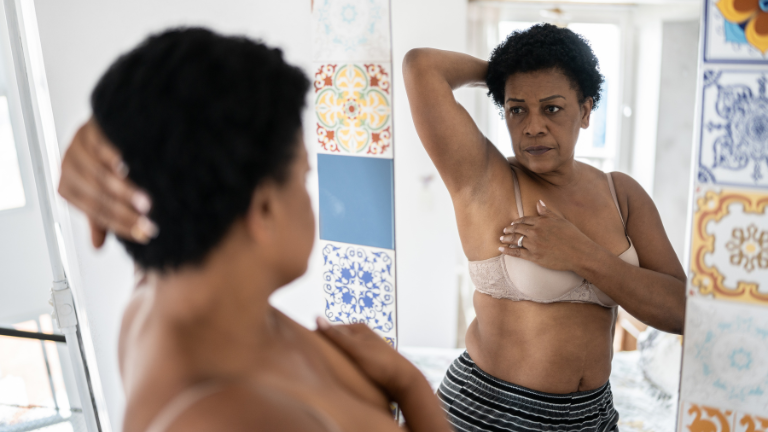
Photo by: FG Trade/Getty Images
Health disparities in breast cancer are complicated. Due to the underrepresentation of Black women in clinical trials, some questions remain unanswered.
It is imperative that Black communities place a strong emphasis on preventative health measures. Black communities urgently need policies that provide access to mammography and high-quality healthcare facilities.
Anyone can be affected by breast cancer; family history is not a requirement to get it.
Although your genetics cannot be changed, you can change your lifestyle to lower your risk. Start by recognizing unhealthy behaviors and acting to change them (for example, do you smoke cigarettes, if so, you should work on quitting).
Diet

Photo by: lisegagne/Getty Images
According to cancer.org, obesity and being overweight increase the risk of breast cancer, particularly after menopause. Adult weight gain increases your risk.
Most of your estrogen after menopause comes from fat tissue. Your body produces more estrogen when you have more fat tissue, which increases your risk of developing breast cancer.
Additionally, women who are overweight typically have higher insulin levels. Breast cancer has also been connected to higher insulin levels.
Additionally, there are several foods and beverages that you may wish to limit or avoid, such as:
- Soda
- Alcohol
- Foods high in sodium (salt) (e.g., processed, and fast food)
Exercise

Photo by: Riska/Getty Images
The risk of breast cancer is reduced by regular exercise, according to numerous research.
According to the most recent updates to the American Cancer Society’s dietary and physical activity recommendations, you should engage in 150–300 minutes of moderate intensity activity or 75–150 minutes of high intensity activity per week.
Other sedentary behaviors like lying down, watching TV, or doing other screen-based activities should also be avoided, especially if the majority of your day is spent sitting down.
Eliminate The Use of Certain Beauty Products
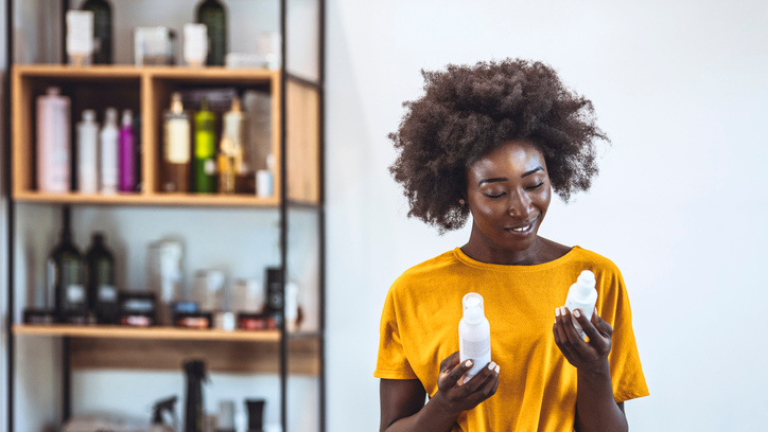
Photo by: ljubaphoto/Getty Images
Endocrine disruptors, such as hydroquinone, mercury, and diethyl phthalate (DEP), may be included in several personal care and beauty items marketed to Black women.
According to research, being exposed to certain components may make a person more vulnerable to developing cancer.
Most frequently, these compounds can be found in:
- Skin lighteners
- Hair relaxers
- Artificial nails
If you’re attempting to lower your risk of breast cancer, you might want to think about restricting or stopping the usage of these goods.
Consider utilizing hormone replacement treatment carefully (HRT)
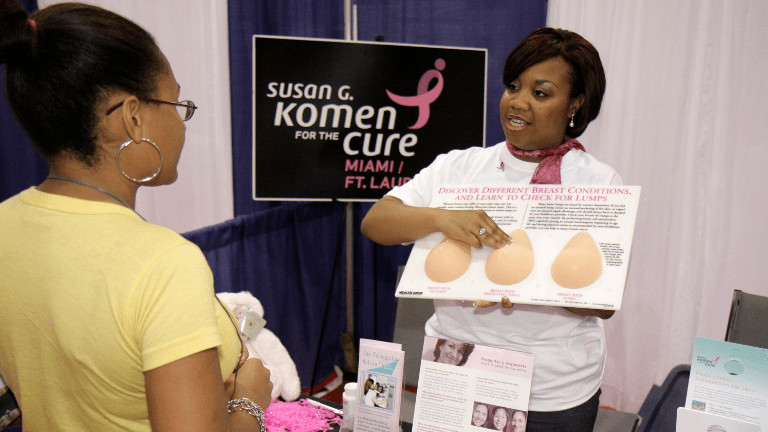
Photo by: Jeffrey Greenberg/Universal Images Group via Getty Images
According to studies, HRT that combines progestin and estrogen raises the risk of breast cancer. Additionally, this combination may increase breast density, which makes it more challenging to detect breast cancer on a mammography.
The good news is that the risk reverts to that of a woman who has not used HRT three years after the hormones are stopped.
It can be preferable for women who have undergone hysterectomy to take HRT that exclusively contains estrogen. Breast cancer risk is not increased by estrogen alone.
However, estrogen-only HRT increases the risk of endometrial cancer in women who still have a uterus.
Discuss with your doctor, and go over all of the menopause symptom control choices, their benefits, and drawbacks. It is advised to start HRT as soon as possible and at the lowest dose that will work for you.
Here are some organizations that help educate the Black community about the risks of Breast cancer:
- African American Breast Cancer Alliance, Inc. (AABCA): This organization assists African Americans women with breast cancer diagnosis, treatment, and rehabilitation.
- For the Breast of US: A breast cancer network for women of color that supports them, fights for them, challenges, stereotypes, gets rid of barriers, and does so much more.
- Black Women’s Health Imperative: The only goal of this organization is to enhance the general wellness of African American women and girls.
- Sisters by Choice: This organization supports both men and women who have been diagnosed with breast cancer and seeks to eradicate the illness by providing cutting-edge educational programs and breast health advocacy groups.
- Sisters Network Inc.: Sister’s Network Inc. is dedicated to raising awareness of the catastrophic effects that breast cancer has on the African American community locally and nationally.
Increase the likelihood of spotting breast cancer early, when it can be treated more easily by understand how your breasts typically feel and appear. If you observe changes in your breast, consult your doctor as soon as possible. If you have a higher risk, such as a family history of cancer, consult your doctor.
TV One supports women and men that are fighting against Breast Cancer, and those who are survivors.
Like TV One on Facebook and be sure to follow us on Instagram and Twitter.



